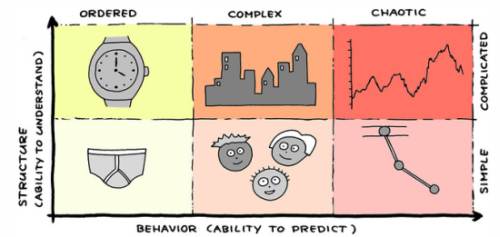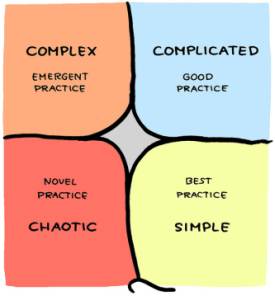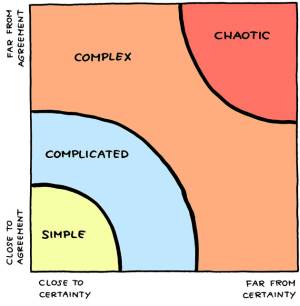
Jurgen Appelo gaat in zijn Management 3.0: Leading Agile Developers, Developing Agile Leaders in op de mentale voorkeur voor lineair denken, de drogreden van causaliteit en het verschil tussen complex en gecompliceerd.

One thing I learned, painfully, is that no matter what you plan for the system, it is not going to happen. The world doesn’t work that way. The system you live in doesn’t care about your plans. You may think that A leads to B, and in theory, you might even be right. But theory rarely works in practice, and predictability has a devious sister named complexity.”
“The idea that things happen as we’ve planned … has its roots in our innate preference for causal determinism. This is “the thesis that future events are necessitted by past and present events combined with the laws of nature.” Causal determinism tells us that each thing that happens is caused by other things that happened before. Logically this means that if we know all about our current situation, and we know all variants of one thing leading to another, we can predict future events by calculating them from prior events and natural laws. (…) But strange as it seems, causality is not enough.”
“If predictability is the friendly and reliabel son of the neighbors next door, complexity is his unfathomable and untruly little sister. (…) People sometimes confuse complexity with large numbers (like many things going on at the same time), but complex things aren’t always large. (…) Complexity doesn’t necessarily follow from large numbers.”
“Unfortunately, we are faced with a slight inconvenience when applying complexity theory to problem solving. Our minds prefer causality over complexity. .. [T]he human mind has an overdeveloped sense of cause and effect, which primes us to see purpose and design everywhere, even where there is none. (…) We attribute cause and effect to all things around us, even when there’s no reason to.”
“Our minds are wired to favor what I call “lineair thinking” (assuming predictability in cause and effect) over “nonlineair thinking (assuming things are more complex than that.). We are accustomed to stories being told linearly, from start to finish. School taught us lineair equations and largely ignored the much more ubiquitous nonlineair equations simply because they're too hard to solve. We accept "he did it" much more easiliy than "well, some things just happen.". Whenever there's a problem B, we assume that event A caused it. (...) Our lineair thinking minds see the world as a place full of easily explainable events with simple causes and simple effects. Gerald Weinberg called it the Causation Fallacy."
"Our mental addictions to causal determinism has led people to use control in their attempts to make sure that the right events are separated from the wrong ones. (...) Engineers and other people with technical minds are particularly susceptible to the concept of control. It was engineers who developed scientific management, the command-and-control style of management that has been all the rage since the early 20th century. (...) We all know by now that these control systems work adequately only with repetitive tasks that don't require much thinking. But they don't work with creative product development!"
"One of the achievements of systems theory (an area of study called general systems theory) ... was shifting the focus from elements in a system to the organization of elements, thereby recognizing that relationships among elements are dynamic, not static. Scientists studied concepts like autopoiesis (how a system constructs itself), identity (how a system is identifiable), homeostasis (how a system remains stable), and permeability (how a system interacts with its environment). (...) [The] legacy of general systems theory is significant. Almost all laws for system theory also turn out to be valid for complex systems."
"Cybernetics is the study of regulatory systems that have goals and interact with their environment through feedback mechanisms. The goals of cybernetics itself is to understand the processes in such regulatory systems, which include iterations of acting (having an effect on the environment), sensing (checking the response of the environment), evaluating (comparing the current state with the system's goal), and back again to acting. This circular process is a fundamental concept in the study of cybernetics."
"When we see systems theory and cybernetics as the two legs of the body of knowledge of systems, one of its arms is certainly dynamic systems theory. (...) [D]ynamic ystems theory explains that dynamic systems have many states, some of which are stable and some of which are not. When parts of the system never change over time, or when they always settle back to original values after having been disturbed, we say that the stable states are acting as attractors."
"If we consider dynamical systems theory as one arm of the body of knowledge of systems, game theory must certainly be the other one. Multiple systems often compete for the same resources - or try to have each other for lunch. Game theory indicates that, in such cases, systems may develop competing strategies. As another branch of applied mathematics, game theory attempts to capture behavior of systems in strategic situations, where the success of one depends in part on the choices made by others."
"Evolutionary theory has helped in understanding growth, survival, and adaption of systems over time. (...) It is said that teams, projects, and products evolve while adapting to their changing enviromennt."
"Chaos theory taught us that even the smallest things in a dynamic system can have tremendous consequences at a later time. This means that the behavior of many systems is ultimately unpredictable because minor issues can turn into big problems, as any software team is eager to acknowledge. This innate unpredictability of dynamic systems has farreaching consequences for estimation, planning, and control, which is a well-known concern among climate scientists and traffic experts but less readily accepted among project managers and line managers."
"Simplicity usually relates to the burden which a thing puts on someone trying to explain or understand it. Something which is easy to understand or explain is simple, in contrast to something complicated."
"If you're going to discuss simplicity, it is useful to know the difference between complex and complicated. Not knowing the difference means you might apply exactly the wrong approach to the right problem (or the right approach to the wrong problem)."
Volgens Jurgen Appelo kan het verschil tussen complex en gecompliceerd worden uitgelegd door gebruik te maken van twee dimensies: (a) de structuur van het systeem en hoe goed deze te begrijpen is, en (b) het gedrag van het systeem en hoe goed dit te voorspellen valt:
(a) Structuur
- Simple = gemakkelijk te begrijpen
- Complicated = heel moeilijk te begrijpen
(b) Gedrag
- Ordererd = volledig voorspelbaar
Complex: een beetje voorspelbaar (maar met veel verassingen) - Chaotisch (chaotic) = heel onvoorspelbaar
De voorbeelden zijn: een onderbroek, een horloge, een stad, een drie-persoons softwareontwikkelteam, een dubbele pendule en aandelenmarkten.

Cynefin is a framework devised by knowledge management scholar David Snowden. It describes a typology of contexts using four domains: Simple, Complicated, Complex and Chaotic (with Disorder as a fifth domain in the middle) and is used to guide approaches to decision making and policy making.

Management professor Ralph Stacey created something similar called the Agreement & Certainty Matrix. It shows Simple, Complicated, Complex, and Anarchy (Chaos) as four areas based in two dimensions: the degree of agreement and the degree of uncertainty.
Bron: Management 3.0: Leading Agile Developers, Developing Agile Leaders, Jurgen Appelo
